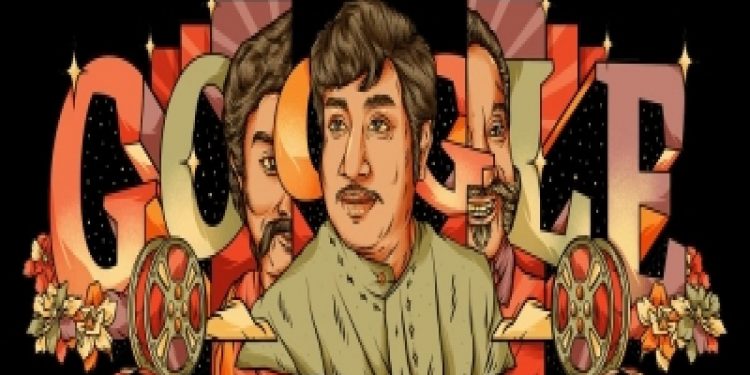Chennai: Sivaji Ganesan needs no introduction. The innumerable characters he made memorable on screen gave him a permanent place in the hearts of millions of movie-goers, and he still lives there, 20 years after he passed away July 21, 2001, at the age of 73.
Friday, October 1, to celebrate his 93rd birth anniversary, the legendary actor, who was also a recipient of the Dada Saheb Phalke Award, the country’s highest award for cinema, has been honoured by Google with a Google Doodle.
The Google Doodle, created by a guest artist from Bengaluru, Noopur Rajesh Choksi, has brought back fond memories of the legend, popularly known as the “Marlon Brando of Indian cinema”, who was adored for his performances in Tamil, Telugu, Kannada and Malayalam movies, and also in Sinhalese and Hindi productions.
Born as Villupuram Chinniah Ganesan, or V.C. Ganesan, at Villupuram in the then South Arcot district of Tamil Nadu, Sivaji Ganesan entered the world of theatre at the young age of 7. He started playing child and female roles at a young age in popular theatre groups, and also trained in three dance forms — Bharatanatyam, Kathak and Manipuri.
Ganesan’s big break in acting came when he was portraying the Maratha King, Chhatrapati Shivaji Maharaj, in the play ‘Sivaji Kanda Samrajyam’, written and directed by the late former Chief Minister of Tamil Nadu and doyen of Dravidian politics, C.N. Annadurai.
The name Sivaji became iconic and Ganesan retained the name throughout his extraordinarily brilliant acting carrier. The big break for the legendary actor came with the Tamil film, Parasakthi, directed by Krisnan-Panju and written by M. Karunanidhi, DMK leader and late former Chief Minister of Tamil Nadu.
Critics have listed several movies as his best, but Sivaji Ganesan himself rated his performance as V.O. Chidambaram in and as ‘Kappalottiya Thamizhan’ as his most memorable one.
Sivaji Ganesan was remembered for his extraordinary flair for dialogue delivery. He pioneered an exquisite style, diction, tone and tenor. His style of dialogue delivery helped him play such mythological and historical characters as Lord Shiva in (‘Thiruvilaiyaadal’), the great Chola emperor in and as ‘Raja Raja Cholan’, the Vaishnavite saint (and one of the 12 Alvars revered in southern India), Periyalvar, in ‘Thirumal Perumal’, and the seventh-century Shaivite saint Appar in ‘Thiruvarutchelvar’.
The legend was addressed as ‘Nadigar Thilagam’ (literally translated as ‘the pride of actors’) for his all-around acting performance, but ironically, Sivaji did not receive any National Award, except for a Special Jury Mention for a cameo appearance in the Kamal Haasan-starrer ‘Thevar Magan’ released in 1992. Predictably, the legend rejected the award.
The French government, however, bestowed upon him its highest decoration, Chevalier of the National Order of the Legion of Honour, in 1995.
Sivaji Ganesan was unsuccessful in politics, unlike his compatriot M.G. Ramachandran, fondly referred to as MGR, who became Chief Minister and one of the most popular leaders of the state. His ‘Parasakthi’ scriptwriter M. Karunanidhi, too, went on to become Chief Minister.
The legend was engaged in politics as a Dravida Kazhagam activist and later as a member of the Dravida Munnetra Kazhagam (DMK), but he crossed over to the Congress in the late 1950s.
He joined hands with the Congress (O) led by another Tamil leader K. Kamaraj, after the Congress split in 1969 and later aligned himself with Indira Gandhi after the passing away of Kamaraj. Eventually, Sivaji Ganesan left the Congress and floated his own ‘Tamizhaga Munnetra Munnani in 1989, but had to face a crushing defeat at the electoral hustings.
The cinema legend could not become a political superstar.






































